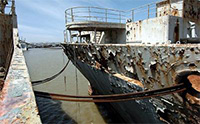Study Reveals Ghost Fleet to be Constantly Discharging Toxins
Demands Made for a Moratorium on Export and Reefing and an Aggressive US Recycling Program
BAN Press Release
 |
 |
 |
 |
| |
 |
|
| |
Victory Ships continue to peel and rust in Suisun Bay.
Photo by
Karl Mondon (Contra Costa Times) |
|
 |
 |
 |
|
| |
19 June 2007 (Seattle, WA.) –
In an article this Sunday, the California newspaper Contra Costa Times revealed that the "ghost fleet" ships have lost 25% of their toxic paints and that high levels of toxic heavy metal contamination of the waters and sediments have accumulated beneath and near the Suisun Bay ex-naval ship "parking lot" in Northern California. The report is based on a Maritime Administration (MARAD) funded study obtained by Arc Ecology, an environmental organization in San Francisco, through the Freedom of Information Act. The environmental organization Basel Action Network (BAN) is now demanding immediate action to harness all domestic capacity to finish the job of scrapping the "ghost fleet" in the United States at the earliest possible date. But under no circumstances should the toxic ships be exported to pollute other countries or be dumped into the sea as artificial reefs.
"These old US ships, wherever they may be sitting, have now been revealed to be more than timebombs, as they are constantly releasing highly toxic contaminants into our precious marine ecosystems," said Jim Puckett, BAN coodinator. "The crisis is real and it's happening daily. This situation must be seen as an opportunity for this country to create jobs and responsibly handle the mess through remediation and recycling rather than export it or dump it in the sea as has been too often done by the government in the past."
The environmental groups noted that there are eight MARAD pre-qualified ship recyclers in the United States that are fully capable of doing the job of remediating and recycling the ships in the US. But all of these yards are presently operating at under capacity. The MARAD ship disposal program moved 22 ships to domestic scrappers last year. According to Polly Parks, Coordinator of the North American Ship Dismantlement Association, the domestic ship dismantling industry could easily double the tonnage dismantled last year and could ramp up capacity dramatically beyond that if the ship "pipeline" was regular. Currently the National Defense Reserve Fleet contains 70 ships slated for disposal but more are expected each year.
Meanwhile the price of steel and the cost of towing is at an all-time high. Both of these factors make domestic, local scrapping a better deal for taxpayers then ever before. Further, BAN notes that the Basel Convention calls for national self-sufficiency in hazardous waste management, and that efforts to export ships in the past have been disastrous either for the US taxpayer (in the case of the UK) or for foreign workers' health (in Asia). Finally the group asserted that the latest study should slam the door on using the vessels as artificial reefs unless all of the paints are first removed.
"Doing nothing is no longer an option," said Puckett, "and neither is throwing them uncleaned into the sea or dumping them on developing countries. But we do have an obvious option of safely recycling these ships at home. Now that we see the constant toxic discharge, waiting any longer can only be seen as gross negligence."
BAN is demanding that Congress, MARAD and the Navy adopt a moratorium on the export and reefing of all ships from the United States unless all toxic substances have been first completely removed, and that a policy is put into place to urgently maximize the existing capacity of the homegrown ship recycling industry.
For more information contact:
Jim Puckett, Basel Action Network 206-652-5555, cell 206-354-0391, jpuckett@ban.org
News story can be found at: http://www.contracostatimes.com/search/ci_6163892
Study can be found at: http://bayareanewsgroup.com/multimedia/cct/multimedia/pdf/suisunpollute.pdf
FAIR USE NOTICE. This document contains copyrighted material whose use has not been specifically authorized by the copyright owner. The Basel Action Network is making this article available in our efforts to advance understanding of ecological sustainability and environmental justice issues. We believe that this constitutes a 'fair use' of the copyrighted material as provided for in section 107 of the US Copyright Law. If you wish to use this copyrighted material for purposes of your own that go beyond 'fair use', you must obtain permission from the copyright owner.
More News
|